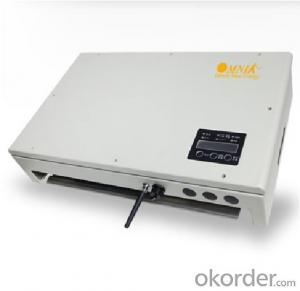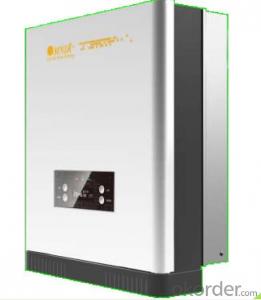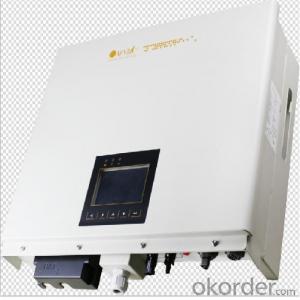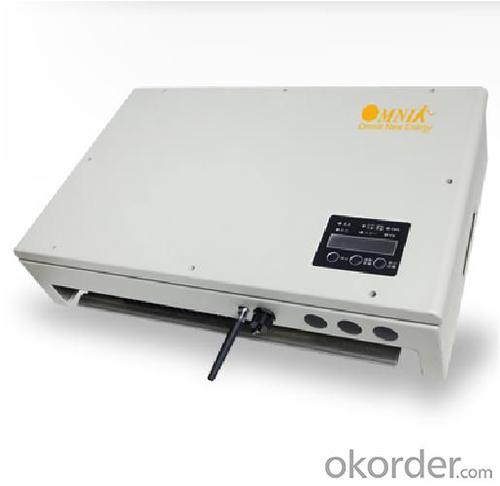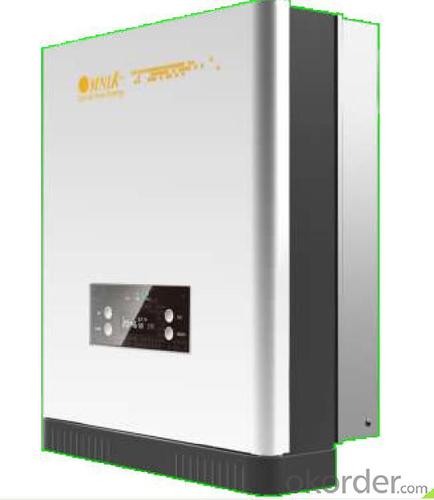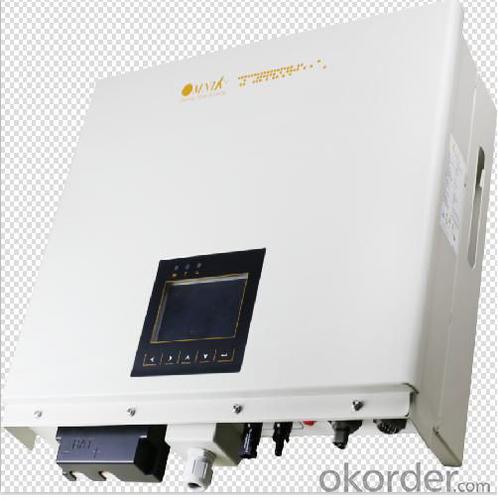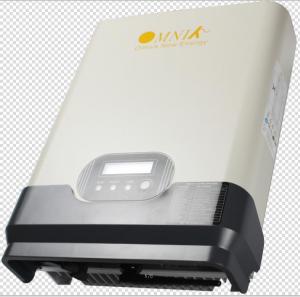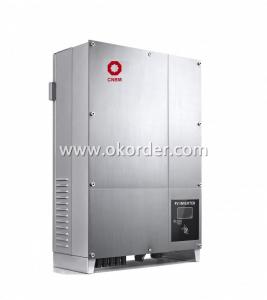4kW On Grid Solar Inverter Omniksol-3.0k-JP
- Loading Port:
- Shanghai
- Payment Terms:
- TT OR LC
- Min Order Qty:
- 1 pc
- Supply Capability:
- 3000 pc/month
OKorder Service Pledge
OKorder Financial Service
You Might Also Like
Omnik new energy solar inverter
Omniksol-2.0k-TL Photon Efficiency up to 3kW
in the world------ Photon tested Jan. 2012.
Omniksol-3k-JP
Omniksol-4k-JP PV inverter ,featuring two MPPT tracker, maximum converstaion efficiency 96.2%,off-grid to on grid mutual switch , IP 65 Protection design, easy installation , is special designed for Janpan consumer.
1.Features
Transformer design, high frequency isolation technology with high security
High efficiency (Max.96.2%), High MPPT accuracy(>99.9%)
2 MPPT design, reach the maximum output power
Wide DC input range (95-420 Vdc),lower start voltage 65Vdc
on-grid/ off grid switch function
IP 65 design, suitable for indoor and outdoor installation
10 years warranty(10~25 years as option)
2.Technical data:
Inverter Type | Omniksol-3k-TL | Omniksol-4k-TL | Omniksol-5k-TL | |
| Input(DC) | Max.PV Input voltage[V] | 450 | ||
| Input Voltage Range(MPPT)[V] | 95-420 | |||
| Operation voltage Range[V] | 75-420 | |||
| Rating Input voltage[V] | 280 | |||
| Wake Up voltage[V] | 65 | |||
| Number of MPPT Trackers | 2 | |||
| Input Power Limitation[W] | 1600 | 2100 | 2600 | |
| Input Current Limitation[A] | 8 | 10 | 12 | |
| MPPT Efficiency | 99.90% | |||
| Efficiency | >96% | >96% | >96.2% | |
| Input Switch[A] | 8 | 10 | 12 | |
3. Product certificate
JET
CE
ISO
4.product outlook
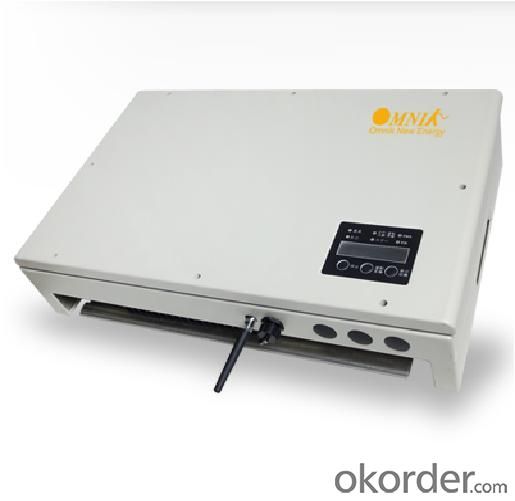
FAQ
1. How long will my inquiry get response?
Your inquiry related to our products or prices will be replied within 24 hours.
2. Can I get professional service and suggestion?
Well-trained and experienced staffs to answer all your questions in fluent English.
3. Do you accept OEM or customized design?
OEM & ODM, any your customized lightings we can help you to design and put into product.
4. What if I need specific design?
Distributorship are offered for your unique design and some our current models.
- Q: Can a solar inverter be used for off-grid systems?
- Yes, a solar inverter can be used for off-grid systems. In fact, it is an essential component of off-grid solar systems as it converts the DC power generated by solar panels into AC power that can be used to run appliances and devices. The solar inverter also manages the charging and discharging of batteries in off-grid systems, ensuring a stable and reliable power supply even when the sun is not shining.
- Q: What is the role of a solar inverter in preventing system downtime?
- The role of a solar inverter in preventing system downtime is to convert the direct current (DC) produced by solar panels into alternating current (AC) that can be used to power electrical devices and to feed excess energy back into the grid. By maintaining a stable and reliable flow of electricity, solar inverters help prevent disruptions and downtime in the solar energy system, ensuring continuous operation and maximizing energy efficiency.
- Q: How does a solar inverter handle voltage drop?
- A solar inverter handles voltage drop by continuously monitoring the voltage levels from the solar panels. It adjusts its output voltage accordingly to ensure that the electricity being produced is compatible with the grid or the appliances it is connected to. This helps to compensate for any voltage drop that may occur due to factors such as distance, resistance, or shading, thereby maintaining a consistent and stable power supply.
- Q: What is the role of a reactive power controller in a solar inverter?
- The role of a reactive power controller in a solar inverter is to regulate and manage the reactive power flow in the electrical system. It ensures the power factor remains within acceptable limits, improving the overall stability and efficiency of the solar inverter system. The reactive power controller monitors the reactive power demand and supply, adjusting the voltage and current as needed to maintain a balanced power factor and minimize losses in the system.
- Q: What are the key safety features to look for in a solar inverter?
- The key safety features to look for in a solar inverter include: 1. Overvoltage and undervoltage protection: This feature ensures that the inverter can handle voltage fluctuations and prevents damage to the electrical system. 2. Ground fault protection: It is essential for the inverter to have ground fault protection to prevent electric shocks and ensure the safety of the system. 3. Anti-islanding protection: This feature ensures that the solar inverter shuts down in the event of a power outage, preventing it from sending power back to the grid and endangering utility workers. 4. Overtemperature protection: A reliable solar inverter should have overtemperature protection to prevent overheating and potential fire hazards. 5. Surge protection: The inverter should have built-in surge protection to safeguard against power surges caused by lightning strikes or grid fluctuations. 6. Arc fault protection: This safety feature detects and mitigates the risk of arc faults, which can result in electrical fires, by rapidly shutting down the inverter. 7. Monitoring and fault detection: A good solar inverter should have a monitoring system that detects faults or abnormalities in real-time, allowing for prompt maintenance and troubleshooting. 8. Compliance with safety standards: Ensure that the solar inverter complies with relevant safety standards, such as UL (Underwriters Laboratories) or IEC (International Electrotechnical Commission), to guarantee its safety and reliability. By considering these key safety features, you can ensure the overall safety and performance of your solar inverter system.
- Q: How does a solar inverter handle variations in solar panel cleanliness?
- A solar inverter does not directly handle variations in solar panel cleanliness. However, a decrease in solar panel cleanliness can lead to a decrease in the overall energy output of the solar system. This reduced energy input is then processed by the solar inverter, which converts it into usable electricity. Therefore, while a solar inverter itself does not handle the cleanliness of solar panels, it indirectly adapts to variations by adjusting the energy conversion process based on the input it receives from the panels.
- Q: Can a solar inverter be used in systems with different module orientations?
- Yes, a solar inverter can be used in systems with different module orientations. Solar inverters are designed to convert the direct current (DC) generated by the solar panels into alternating current (AC) that can be used to power electrical devices. They are compatible with various module orientations, including both portrait and landscape orientations. However, it is important to consider the efficiency and performance of the solar system when installing modules with different orientations, as it may affect the overall energy production.
- Q: How does a solar inverter handle voltage sag or drop in the grid?
- A solar inverter handles voltage sag or drop in the grid by continuously monitoring the grid voltage. When it detects a voltage sag or drop, the inverter quickly adjusts its output voltage to compensate for the fluctuation, ensuring a stable and consistent power supply. This is achieved by utilizing the inverter's control algorithms and power electronics to regulate the output voltage and maintain grid compatibility.
- Q: What are the key factors affecting the installation process of a solar inverter?
- The key factors affecting the installation process of a solar inverter include the location and orientation of the solar panels, the size and capacity of the inverter, the electrical infrastructure of the building, the type of mounting system used, and compliance with local regulations and building codes. Additionally, factors such as shading, temperature, and maintenance accessibility should also be considered during the installation process.
- Q: What are the key factors affecting the compatibility of a solar inverter with other system components?
- The key factors affecting the compatibility of a solar inverter with other system components include the power rating and voltage compatibility of the inverter with the solar panels, batteries, and electrical grid, as well as the communication protocols and interconnectivity requirements between the inverter and other system components. Additionally, the inverter's efficiency, protection features, and overall design should be considered to ensure seamless integration and optimal performance of the entire solar power system.
Send your message to us
4kW On Grid Solar Inverter Omniksol-3.0k-JP
- Loading Port:
- Shanghai
- Payment Terms:
- TT OR LC
- Min Order Qty:
- 1 pc
- Supply Capability:
- 3000 pc/month
OKorder Service Pledge
OKorder Financial Service
Similar products
Hot products
Hot Searches
Related keywords
